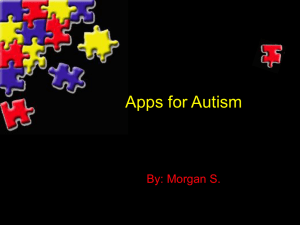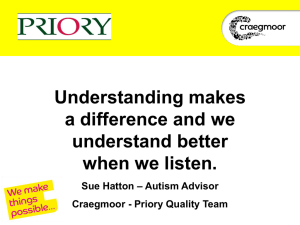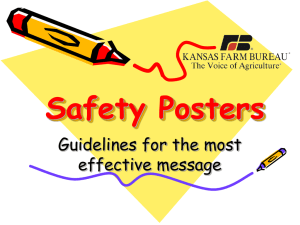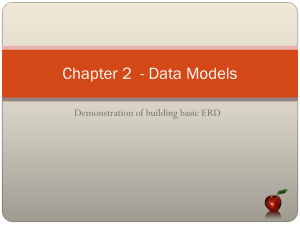Health Insurance for Autism Disorders in Kansas
advertisement
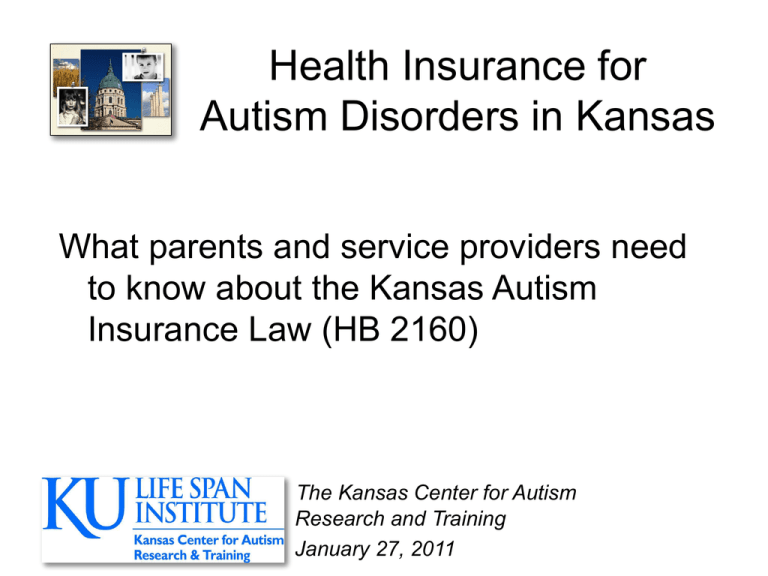
Health Insurance for Autism Disorders in Kansas What parents and service providers need to know about the Kansas Autism Insurance Law (HB 2160) The Kansas Center for Autism Research and Training January 27, 2011 Welcome Deb Kamps and Matt Reece Co-Directors Kansas Center for Autism Research and Training (KCART) www.kcart.ku.edu Kansas Autism Insurance Law Michael Wasmer, DVM, Dipl ACVIM Founder Kansas Coalition for Autism Legislation www.kscoalitionforautism.org House Bill (HB) 2160 Effective January 1, 2011 Only applies to State Employees (“pilot project” statute) Covers diagnosis and treatment (including ABA) Coverage limits • < 19 years • • • 0-6 years: $36,000 7-18: $27,000 financial caps are cumulative Governor Mark Parkinson April 19, 2010 www.kscoalitionforautism.org The Pilot Project Statute • March 1, 2012 legislature will receive 2011 claims data from SEHP for review Will provisions of HB 2160 continue for SEHP and extend to ALL fully funded insurance policies? Need more information? YES beginning July 1, 2013 NO Seamless implementation of HB 2160 is critical Insufficient 2011 claims data may delay/prevent implementation beyond the SEHP or result in termination of the pilot project entirely Is your child eligible for coverage? Make sure service providers are approved providers Make sure claims are filed immediately Legislative plans for 2011? Health Insurance for Autism Disorders in Kansas Mike Michael Deputy Director, State Employee Health Benefit Plan State of Kansas Kansas Health Policy Authority Health Insurance for Autism Spectrum Disorders in Kansas January 27, 2011 • Who is eligible for coverage under the State Employee Health Plan (SEHP) • Summary of the Administrative Provisions of Autism coverage for SEHP members Who is eligible under the State Employee Health Plan • • • • State of Kansas employees Contracted Public Employers Direct Bill members of the above groups Members under the age of 19 from these covered groups who have a diagnosis of Autism are eligible for benefits under the pilot program Summary of the Administrative Provisions of Autism Coverage for SEHP Members – Definitions: – Autism Spectrum Disorder: • A disorder within the autism spectrum: • Autistic disorder • Asperger’s syndrome • Pervasive Developmental disorder, Not otherwise specified – Comprehensive Assessment: • An assessment completed by an appropriate professional, and submission of results Summary of the Administrative Provisions of Autism Coverage for SEHP Members – Periodic Assessment: • An evaluation showing an assessment of the improvement in the individual based upon the diagnosis and approved treatment plan – Treatment Plan: • A submission by a provider or group of providers and signed by both the provider and parent/caregiver Summary of the Administrative Provisions of Autism Coverage for SEHP Members – Benefit Provisions: – Coverage is available for the diagnosis and treatment of ASD – Treatment begins upon receipt and approval of the treatment plan – For newly diagnosed members the comprehensive assessment needs to be completed within 90 days from the beginning of treatment – If the member has already been diagnosed with Autism the comprehensive assessment is not required. A treatment plan needs to be submitted & approved Summary of the Administrative Provisions of Autism Coverage for SEHP Members • Senate Substitute for House Bill No. 2160 • Provides Coverage for: – Children under age 7 ($36,000/year) – Children age 7-19 ($27,000/year) – All services are subject to the applicable deductible, coinsurance and copay arrangements of the health plan Summary of the Administrative Provisions of Autism Coverage for SEHP Members • By March 1, 2012, the Kansas State Employee Health Care Commission shall submit a report to the legislature including the following information: • The impact of the mandated coverage for autism spectrum disorder on the state health care benefits program • Data on the utilization of coverage for autism by covered individuals, and the cost of providing such coverage • A recommendation whether such mandated coverage for autism spectrum disorder should continue for the state health care benefits program, or whether additional utilization and cost data is required Health Insurance for Autism Disorders in Kansas Lisa Hull Director of Operations Center For Child Health and Development University of Kansas Medical Center Filing Claims 101 Information parents need to know when filing an insurance reimbursement claim for autismrelated diagnostic and treatment services If you have selected an autism services provider for your child who does not bill insurance directly or is not a credentialed provider with your insurance company, there are some important things for you to know before you start paying for services. Know Your Insurance Policy • Does my policy have Out of Network Benefits? – If the answer is no, you will need to find a provider who is credentialed with your insurance or understand that no fees are eligible for reimbursement from your insurance company. Your insurance company should be able to provider you with a list of eligible providers in your area. Know Your Insurance Policy • Do I have an Out of Network Deductible that I have to meet? – If yes, you should prepare for this financially. It is important to note that it is still important to file a claim so that your insurance company will credit your payment toward your deductible. – Your insurance company will (most likely) credit their allowable cost toward your deductible, not the amount you pay. Essentially, you may end up spending $8,000.00 to meet a $5,000.00 deductible. If possible, select a provider that charges at or a little above the allowable cost your insurance pays for that service. Know Your Insurance Policy • Obtain a Certificate of Coverage from Human Resources representative at your place of work. Review it and call your insurance company for assistance if needed. Ask: – What is the out-of-network co-pay? – What is the percentage of reimbursement for out-of-network providers? – What are your individual and family out-of network deductibles? Know Your Insurance Policy – What is your out-of-pocket limit? – After you reach your deductable and limits, what percent is the reimbursement for out ofnetwork providers? – What is the lifetime cap? What is the yearly limit? – Do you have home health care benefits? What are they? What are the limits? Your Insurance Company and the Services your Child is Receiving • Understand how your insurance company classifies and administers benefits for the services your child is receiving – Many primary health insurance companies (Coventry) subcontract with another organization (Value Options) to handle benefits for services that are considered mental health. – Some insurance policies consider Autism a biomedical condition and all benefits are administered by the primary medical insurance company Your Insurance Company and the Services your Child is Receiving – Obtain the CPT (Code of Procedural Terminology used to describe what treatment is being provided) as well as the diagnostic code your provider will use (ICD9International Statistical Classification of Diseases and Related health Problems) and call your insurance company to ask if preauthorization or pre-determination is needed for out-of-network providers? If so, what is the submittal process? Failure to meet this requirement will result in a denial of payment. Your Insurance Company and the Services your Child is Receiving Other important questions to ask once you have the CPT and ICD9: – Which services are mental health vs. medical? Is mental health coverage different? What are the deductibles and co-pays, visits, limits and caps for mental health? – How many visits are you allowed for each therapy? What is the appeal procedure if more is needed? KEEP DETAILED RECORDS of each callincluding date, time person's name, phone number, extension and reference number if applicable. What You Will Need to File a Claim – A Claim Form from your insurance company – The Provider’s itemized bill showing: • Letterhead stating the name and address of the person or organization providing the service • The name of the patient receiving the service • The date for each individual service (a range of dates cannot be accepted) • The description of, and reason for, the service, including diagnostic and/or service codes; and • The charge for each individual service • NOTE: Make sure the bill shows that you already paid the provider (shows a zero balance) What You Will Need to File a Claim – Write a cover letter stating you already paid the service and reimbursement should be made out to you, and sent to you directly. – Attach any pre-authorizations and a letter of medical necessity/doctor’s referral or treatment recommendations if available. NOTE: Never send originals, only photocopies!!! Also, your provider should be submitting reports to you about your child’s progress that supports the treatment they provided and your child’s diagnosis. You may not need it to file a reimbursement claim, but you will need it in the event of a denial for payment. Health Insurance for Autism Disorders in Kansas Linda Heitzman-Powell Board Certified Behavior Analyst Becoming a Provider Acquiring an NPI # What is it? Link to get an NPI, https://nppes.cms.hhs.gov/NPPES/Welcome.do Select code 10 Behavioral Health/Social Service Provider 103K00000X Behavior Analyst 17 Other Service Provider 171M00000X Case Manager/Care Coordinator Pick the primary designation Becoming a Provider Required documents needed on file Liability Insurance Background Checks • CPS • APS • KBI Federal or Fingerprints Enrollment Private Practice Acquire application form from each insurance company Each insurance company will have their own form Complete each application as required, include copies of required documents as requested by insurance companies. Organization Insurance Department in each organization will assist with this. Documentation Prior to billing or filing an insurance claim: Ensure all documentation is complete and has the following required information: • • • • • • • • Client/Consumer full name DOB Client Billing Number Providers full name Those in attendance DOS Time of Service All documentation should be signed by at least the provider, check with the insurance requirements for additional required signatures. Webehere 4-you, Inc. 999 Anywhere Street, P.O. Box 888, Everywhereville, KS 11111 Phone: (555) 555-1212 Fax: (555) 555-1213 E-mail: Webehere4you@ks.web SOAP NOTES with Treatment Plan for [Child’s First and Last Legal Name] OurComopany’s Client # 4020-6050 DOB: 12/26/2005 Diagnosis: Autism Provider: Dr. President of the Company, Ph.D., Autism Specialist Service Provided: Consultative Clinical and Therapeutic Services (CCTS) SOAP NOTES with Treatment Plan (Progress Notes) Client’s Name: [Child’s Given Name] DOS: 12-01-07 Parent(s) Name: [Parent’s Given Name] Time: Start: 12:00 pm Stop: 2:00 pm Length of Time: 2 hours Persons Present: [Autism Specialist Name], [Child’s Given Name], [Parent’s Given Name], and [Service Provider’s Name(s)] POS: Home Child Session Subjective: This past week [Child’s Name] has been doing really well. He is starting to ask some of the providers to go “walk-walk” instead of just relying on mom. [Provider 1] said that he used a sentence that was a combination of gestures, sign, and vocal language to say, “Go outside the room and eat cookie.” Objective: Client and family were seen for behaviors and issues related to: Autism. [Child’s Name] was watching the TV (Sesame Street) and imitating the actions of Elmo. In addition, [Child’s Name] spontaneously signed “more” when mom restricted access to his cookie. We worked on Readiness skills, leisure and appropriate play, social interaction, verbal and gestural communication, vocal imitation, and generalized imitation. Programs were reviewed and modifications were made based on the data collected by the IIS. See expanded team meeting notes for details. Assessment: Medication changes - None Modalities of care (protocol) - 1:1 therapy Clinical tests results - N/A Frequency of treatment furnished - Daily 1:1 interaction is IIS provider; bimonthly team meetings with the Autism Specialist Functional status - moderate Symptoms - non-compliance; delayed language; tantrums Prognosis - good Progress to date - good ABLLS: See protocol summary in binder. Next ABLLS scheduled for 2/20/08 Plan: (Treatment Plan - Summary of Services) Continue to engage in intensive 1:1 therapy times with the IIS, working on increasing social responsiveness in naturally occurring sessions. Build language into all therapy and incidental teaching times. Work to make therapy fun. Data to be collected based on program description (see child’s binder and expanded meeting notes) and will be reviewed at each team meeting. Team meetings will occur on a bimonthly basis until the child is stable and skill is steadily increasing. As [Child’s Name] meets criterion in each program, the IIS provider should make program changes based on program description (see child’s binder and expanded meeting notes) and mark a condition line on the graph for review at team meetings with the autism specialist. Follow the behavior plan should tantrum behavior occur (see behavior intervention plan included in child’s binder). Next team meeting: 1/9/08, 12:00 pm, at home. Billing Insurance Provider or Parent • Always bill Primary Insurance first • Once denial or payment has been received, then if there is a secondary insurance it can be billed using the same codes. Billing Agency • Pay a billing agency to handle insurance claims. Billing Challenges Billing Codes Confusion with same codes, different descriptors • AW defines H2019 (Intensive Individual Support) – home and community – cannot duplicate school services • Demo defines H2019 (Tutor) – Must provide IEP for service authorization – FBA (functional behavioral analysis – inaccurate use of term) must follow the IEP • BCBS defines H2019 (Therapeutic Behavioral Services) – Cannot be educational in nature Same code, different service so runs into challenges with multiple avenues for insurance reimbursement Payment Challenges Exclusions What do these exclusions mean for service providers and families? Is the language open to interpretation. Cannot be a “home school” • What defines “home school” – what about “after school?” • What about in a “preschool” setting for community-based therapy? What does this all mean for providing services to individuals? delay of treatment delay of reimbursement Discontinuation of treatment Health Insurance for Autism Disorders in Kansas Vikki Lindemuth Senior Specialty Provider Representative, Professional Relations, Blue Cross and Blue Shield of Kansas Panel Members Robyn Goates (BCBSKS), Adam Powell (New Directions Behavioral Health), Irene Hermreck & Dalrona Harrison (PHS), Shelly Harrison (UMR), Joyce White (Tricare) Claims Submission • Parents guide to filing a claim if it was not filed by the service provider • What are the CPT codes for autism diagnostic and treatment services, including ABA? • Overview of the appeals process for claim denials Health Insurance for Autism Disorders in Kansas Daniel R. Unumb, Esq. Kansas Implementation Lessons From Other States Credentials Kansas Implementation Lessons From Other States •Policy issues •Billing issues •Medical Necessity Kansas Implementation Lessons From Other States • Passage • Implementation • Enforcement Health Insurance for Autism Disorders in Kansas Linda Sheppard Director of Accident and Health Division Kansas Dept of Insurance Kansas Insurance Department Kansas Prompt Pay Act Linda Sheppard, Kansas Insurance Department January 27, 2011 Prompt Pay Act Prompt Pay Act How to File a Complaint Questions •The Kansas Health Care Prompt Pay Act , K.S.A. 40-2440 through 40-2442, establishes a framework for prompt payment of health insurance claims. •In general, an insurer has 30 days to pay a “clean claim” or to send a notice to the consumer stating why the payment has been delayed or denied Prompt Pay Act Prompt Pay Act How to File a Complaint Questions •A “clean claim” is defined as a claim “that has no defect or impropriety, including any lack of substantiating documentation, or particular circumstance requiring special treatment that prevents timely payment . . .” •Failure to comply with the requirements of the Act results in the accrual of interest equal to 1% per month of the billed charges Prompt Pay Act Prompt Pay Act How to File a Complaint Questions •An insurer may request additional information on an unpaid claim, but must do so within the first 30 days •When the additional information is received, the insurer has 15 days to pay or deny the claim. What plans are covered Prompt Pay Act How to File a Complaint Questions •The following plans are included in the Prompt Pay Act: •Fully insured health plans •HMOs •Individual or group major medical plans •Hospital/surgical policies •Dental plans What plans are not covered Prompt Pay Act How to File a Complaint Questions •The following plans are not included in the Prompt Pay Act: •Self-insured employer plans •Medicare/Medicare supplement policies •Medicaid •Workers’ compensation •Federal employee plans •Vision or drug plans •Disability income •Medical claims paid by auto or homeowner’s insurance Slow Payments Prompt Pay Act •If you do not receive a request for additional information, an approval or a denial within 30 days, you have the right to file a written complaint. How to File a Complaint •To report a slow claim payment, send a written notice to the Kansas Insurance Department. Questions •You will be notified when a Consumer Assistance Representative begins to investigate the claim. Complaint Checklist •Submit your complaint in writing. To expedite the process, include the following information: Prompt Pay Act How to File a Complaint Questions •The date the claim was sent to the insurance company, or •The date the insurance company acknowledged receipt •How the claim was submitted – electronically or by mail •A brief description of your attempts to collect •Copies of any written notices or other correspondence How to submit a complaint Prompt Pay Act How to File a Complaint Questions •First, call your insurance company •Have all documents in front of you and explain the situation calmly. •If you are not satisfied with their explanations, call the Kansas Insurance Department •Ask to speak to a Consumer Assistance Representative. A member of our staff will evaluate your situation and, if deemed necessary, will request that you submit a written complaint. How to submit a complaint Prompt Pay Act How to File a Complaint Questions •Once KID receives your complaint, we will contact the appropriate parties to request a response •You will also get an acknowledgement letter from KID •When we receive a response from the company or agent, our review of the information will result in one of the following actions: How to submit a complaint •Results of filing a complaint: Prompt Pay Act How to File a Complaint Questions •The insurer will be asked to complete a reasonable investigation of the claim. •A request of corrective action •An explanation to the consumer about why the investigation is being closed. How to speed up complaint processing Prompt Pay Act How to File a Complaint •Include the following information in your written complaint to speed up processing: •Name, address, phone number and e-mail address •A full explanation of your case Questions •Insurance company information: name, policy number, address How to speed up complaint processing Prompt Pay Act How to File a Complaint •Include the following information in your written complaint to speed up processing: •Copies of documentation to support your case •A description of what has been done to resolve your problem Questions •Keep a copy of the letter you sent to KID for reference Questions? Prompt Pay Act How to File a Complaint Questions Kansas Insurance Department 420 SW 9th St. Topeka, KS 66612 www.ksinsurance.org commissioner@ksinsurance.org Phone: 785-296-3071 Consumer Assistance: 800-432-2484 Fax: 785-296-7805 Health Insurance for Autism Disorders in Kansas Senator Tim Owens Kansas State Senate District 8 (Overland Park) Kansas versus Missouri Scope of Coverage: KS vs MO Questions? • Please submit your completed question forms to the closest volunteer How can you help? Get involved Stay informed Contact your legislators www.kscoalitionforautism.org www.autismvotes.org www.twitter.com/mikewasmer www.kscoalitionforautism.org Autism Votes Mobile • Text "AVotes" to 30644 to sign up! The Kansas Coalition for Autism Legislation (KCAL) www.kscoalitionforautism.org Michael Wasmer wasmer_ms@mac.com 913-626-0668


